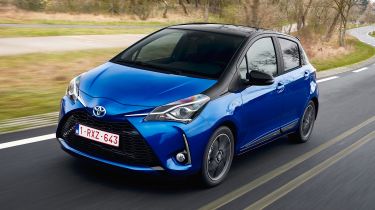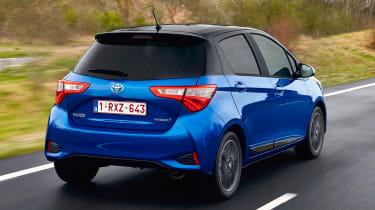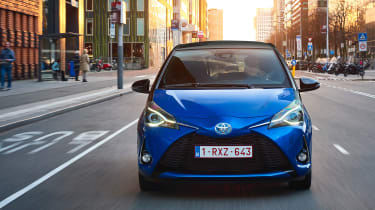Toyota Yaris Hybrid hatchback (2011-2020)
"The Toyota Yaris Hybrid can be very economical and boasts a spacious interior, but it can't offer the driving fun of a Ford Fiesta"
Pros
- Fitted with plenty of equipment
- Spacious interior and boot
- Very cheap to run
Cons
- Noisy gearbox
- Neither quick nor fun to drive
- Some interior plastics feel cheap
The Toyota Yaris has always appealed to young families looking for a compact, practical and reliable hatchback with low running costs. The addition of a hybrid version to the range, further broadened the Yaris’ appeal, with improved fuel economy compared to the petrol models and lower CO2 emissions figures.
Best hybrid and plug-in hybrid cars you can buy today
The Yaris Hybrid initially faced direct competition from the Honda Jazz Hybrid, but that car has now been discontinued. Apart from the Yaris, the smallest hybrid cars you can buy are now the Kia Niro SUV and, at a stretch, the BMW i3 – but both are considerably more expensive than the Toyota. Non-hybrid rivals include the Ford Fiesta, Vauxhall Corsa, Volkswagen Polo, Renault Clio, Hyundai i20 and Kia Rio.
As with its conventional petrol-engined sisters, the Yaris Hybrid is a striking car to look at, with a sharply styled nose and prominent air intakes for a racy look. The sporty style doesn’t translate to a particularly exciting drive, though – its 99bhp is only enough for a 0-62mph time of 11.8 seconds, marginally less nippy than the standard 1.5-litre petrol Yaris. This is chiefly because the hybrid is a slightly heavier car, but the additional weight of its nickel-metal-hydride battery and electric motor don’t make a big difference to its lacklustre handling compared to petrol models.
More reviews
All could be forgiven at the petrol pumps, though: you should need to visit them rather less frequently than drivers of the ‘ordinary’ Yaris will. Toyota claims 85.6mpg is possible from a Yaris Hybrid on 15-inch wheels, while the 16-inch wheels that come with some trim levels reduce this to 78.5mpg. Examples with the smaller wheels also enjoy a lower CO2 emissions figure of 75g/km – low enough for London Congestion Charge exemption.
Every Yaris Hybrid is reasonably well equipped, but our favourite trim level is mid-range Icon, which adds cruise control that could help you improve fuel consumption. Air-conditioning is standard, as is Bluetooth connectivity. Better still, standard autonomous emergency braking comes as part of the Toyota Safety Sense package, which is standard on all models. It also includes lane-departure warning, traffic-sign recognition and auto-dipping headlights, helping the Yaris to achieve its impressive five-star Euro NCAP crash safety rating.
Toyota has always enjoyed a good reputation for reliability, but owners rated the Yaris into a disappointing 58th place out of 75 cars in our 2018 Driver Power satisfaction survey. 10.6% of respondants said their car developed one or more fault in the first year of ownership.
With no diesel model in the Yaris range, the hybrid makes sense for the economy-minded, while also having tax benefits for company-car users. However, increasingly economical rivals such as the Ford Fiesta EcoBoost and SEAT Ibiza TSI have a broader appeal.














